Stories from and about library student employees and interns.
Student Stories
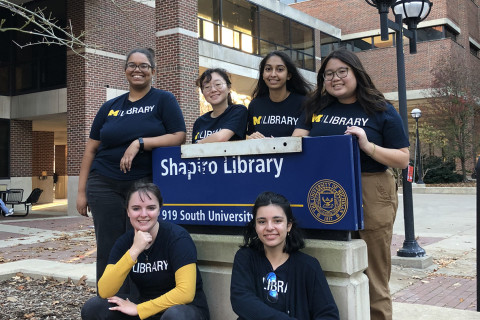
Posts in Student Stories
Showing 51 - 60 of 103 items
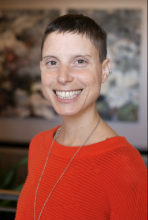
- Marisol Fila
The magazine O Menelick 2Ato is an independent editorial initiative - with a journalistic bias – that aims to reflect on and enhance the cultural and artistic production of the black diaspora in the Americas, with special emphasis on Brazil.
O Menelick 2Ato , created in 2010 in the city of São Paulo, has more than 20 printed editions published, and it’s always distributed for free throughout Brazil. More than 40 thousand copies of the magazine have been distributed over the 10 years of the project's existence. In spite of bringing together collaborators from the most diverse areas of artistic and cultural production - both Brazilians and foreigners - who understand the magazine as a space to share their perspectives and foster their ideas, creativity and concerns regarding the 21st century Brazilian black community, the magazine is closely linked to the history of the black press in Brazil. This connection begins with its title: O Menelick 2Ato honors one of the most important periodicals in the Paulista press, the newspaper O Menelick (1915).
I got to know Nabor Jr and Luciane Ramos Silva, the two editors of the magazine, during a research trip in São Paulo in 2018. Besides their work as editors of the magazine, Luciane Ramos Silva is an anthropologist, choreographer and dancer and Nabor Jr works as a journalist and independent photographer, while also being a staff member of the Museum Afro Brazil, one of the most important museums on African diaspora in the Americas. We have been working together on different projects since 2018, and in March 2019 Luciane Ramos Silva visited U-M to offer a series of workshops and talks on black press in Brazil. Aiming to build on this collaborative partnership, we started working on a special edition of their last issue in English. Until now, the magazine has been published only in Portuguese so having a first edition in English would help to reach new audiences as well as to bring awareness of different experiences of the black diaspora in the Americas.
O Menelick 2Ato , created in 2010 in the city of São Paulo, has more than 20 printed editions published, and it’s always distributed for free throughout Brazil. More than 40 thousand copies of the magazine have been distributed over the 10 years of the project's existence. In spite of bringing together collaborators from the most diverse areas of artistic and cultural production - both Brazilians and foreigners - who understand the magazine as a space to share their perspectives and foster their ideas, creativity and concerns regarding the 21st century Brazilian black community, the magazine is closely linked to the history of the black press in Brazil. This connection begins with its title: O Menelick 2Ato honors one of the most important periodicals in the Paulista press, the newspaper O Menelick (1915).
I got to know Nabor Jr and Luciane Ramos Silva, the two editors of the magazine, during a research trip in São Paulo in 2018. Besides their work as editors of the magazine, Luciane Ramos Silva is an anthropologist, choreographer and dancer and Nabor Jr works as a journalist and independent photographer, while also being a staff member of the Museum Afro Brazil, one of the most important museums on African diaspora in the Americas. We have been working together on different projects since 2018, and in March 2019 Luciane Ramos Silva visited U-M to offer a series of workshops and talks on black press in Brazil. Aiming to build on this collaborative partnership, we started working on a special edition of their last issue in English. Until now, the magazine has been published only in Portuguese so having a first edition in English would help to reach new audiences as well as to bring awareness of different experiences of the black diaspora in the Americas.
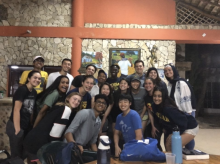
- Julia Yee
The Pre-Medical Club’s (PMC) Alternative Spring Break (ASB) is a health-oriented service and educational trip for students at the University of Michigan. Since its beginning in the early 2000s, PMC has worked with the Community Service Alliance (CSA) in the Dominican Republic to organize and plan the spring breaks each year. CSA is a multi-faceted organization which strives to empower communities through health initiatives, educational and youth programs, and a focus on supporting female community members. We have continued to partner with CSA throughout the years because of the positive effects we observe in the communities and because of the level of involvement they permit students to have.
Although CSA has many projects in multiple areas throughout the Dominican Republic, our group has chosen to orient our spring breaks around their health initiatives and educational programs. Additionally, the past four years we have been in the same province: Hato Mayor. Each year, the details of the project change, however the objectives remain the same. Following the goals of CSA, we hope to empower and build up communities in terms of health to a point where they can continue health practices safely and independently after we and CSA leave.
Our spring break this year focused on two main projects: water filter installation and bathroom construction. Before embarking on our journey, CSA provided us with the schedule and project goals. We aimed to install eight water filters and construct two bathrooms in two separate communities during our five days of work. Along with the manual work, we also allotted two afternoons of the trip to speak with school children about hand-washing and general hygiene tips. On the schedule were other events where we could learn more about the Dominican Republic and its health system and culture. These events included a tour of a cacao farm, dance lessons from a local dance group, and a visit to a local health clinic for a presentation and a Q&A session.
Although CSA has many projects in multiple areas throughout the Dominican Republic, our group has chosen to orient our spring breaks around their health initiatives and educational programs. Additionally, the past four years we have been in the same province: Hato Mayor. Each year, the details of the project change, however the objectives remain the same. Following the goals of CSA, we hope to empower and build up communities in terms of health to a point where they can continue health practices safely and independently after we and CSA leave.
Our spring break this year focused on two main projects: water filter installation and bathroom construction. Before embarking on our journey, CSA provided us with the schedule and project goals. We aimed to install eight water filters and construct two bathrooms in two separate communities during our five days of work. Along with the manual work, we also allotted two afternoons of the trip to speak with school children about hand-washing and general hygiene tips. On the schedule were other events where we could learn more about the Dominican Republic and its health system and culture. These events included a tour of a cacao farm, dance lessons from a local dance group, and a visit to a local health clinic for a presentation and a Q&A session.
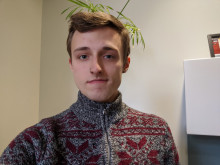
- Logan Burley
Gender is a powerful social category that individuals constantly use to make sense of both themselves and those around them. The Western world splits people into two categories: woman and man. These two gender categories can be used to visually sort almost all things. Individuals constantly attribute masculinity of femininity not only to people, but to animals and objects, too. With this in mind, my thesis hoped to examine how individuals interpret the gender cues that others present, particularly those present in the face. Individuals who identify outside of the man-woman dichotomy are gaining increased visibility. The core question is how has the increasing visibility of the nonbinary community begun to change how people conceptualize gender, particularly in how they perceive the gender of others?
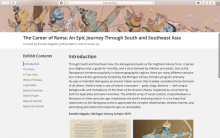
- Estrella Raquel Salgado
Rising junior Estrella Salgado reflects on her experience as a Michigan Library Scholar during the summer of 2019. Her project led her to create an online exhibit about one of the world's greatest epics, the Ramayana. This experience led to increased cultural appreciation, effective organization skills, and a heightened interest in library careers.
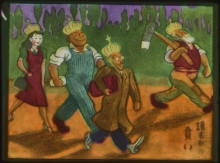
- Dorothy Feixuan Ma
Dorothy Ma's Final Reflection Blog Post for the 2019 Michigan Scholars Program, the Increasing Accessibility to Digital Image Collections in Japanese Studies project.

- Liesa Nicole Bruin
Ever wonder what rights you have to your work? Rising junior Liesa Bruin shares her experience working with the U-M Library Copyright Office (LCO) as a Michigan Library Scholar.
•
- Shaima Abdullah
This summer we joined the Library Environments department for an internship focused on exploring the meaning of library as a place in different countries and cultures, in order to help the U-M Library make its spaces more welcoming and inclusive for our international students. The objective of this project was to learn how scholars in other countries engage with library spaces: the kinds of spaces available, and norms for their use. In this blog post we reflect on our experiences in the internship.

- Emily Bloom
This past summer, I had the opportunity to work with the U-M Library Copyright Office (LCO) to develop a resource on international copyright law. As a rising senior who was still unsure of what I wanted to do after college, I am constantly looking for experiences to help guide me to a decision. This internship did just that. Interning with the Michigan Library Scholars Program not only helped me decide what I want to do once I graduate, but it aided my professional and academic growth.
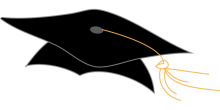
- Meghan Kate Brody
Graduating senior Meggie Brody shares what she learned from working in a variety of positions at U-M Library, and says, "If I can leave future U-M students with one piece of advice, it would be this: don’t be afraid to ask."
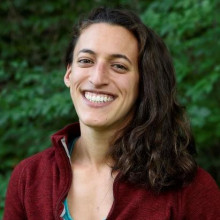
- Rebekah Ann Stein
EARTH-RISE is a multidimensional project focusing on bridging the gap between high school and tertiary education in STEM, particularly earth sciences, and addressing the leaky pipeline for students in high schools that are under-funded and lack resources. The earth sciences are generally excluded from most high school curricula. Many earth science majors discovered the track upon entering college; most people are unaware it is a discipline throughout secondary school and beyond. In order to attract the attention of more students, it is important to strengthen earth science secondary (and primary) education. Additionally, two of the major components that promote retention through college and beyond is whether students identify as a member of the scientific community, and whether students have access to mentors they respect who are also enthusiastic. This project hopes to rectify both issues by introducing major topics in earth sciences in an accessible and exciting way (in the high-school classroom, in the laboratory, and in the field).
This program focuses on hands-on experiences (in-class, research and in field) for high school students to encourage retention in earth sciences. EARTH-RISE is designed to form a long-lasting relationship between Ypsilanti Community High School (and Ypsilanti public schools in general), Detroit public schools, and the University of Michigan Earth department. It focuses on encouraging high school students to engage in hands-on activities and research in Earth Sciences. The students at Ypsilanti Community High School received little science education in middle school and, lacking enthusiasm and encouragement from teachers during formative years, have ruled out pursuit of STEM in later years.
This program focuses on hands-on experiences (in-class, research and in field) for high school students to encourage retention in earth sciences. EARTH-RISE is designed to form a long-lasting relationship between Ypsilanti Community High School (and Ypsilanti public schools in general), Detroit public schools, and the University of Michigan Earth department. It focuses on encouraging high school students to engage in hands-on activities and research in Earth Sciences. The students at Ypsilanti Community High School received little science education in middle school and, lacking enthusiasm and encouragement from teachers during formative years, have ruled out pursuit of STEM in later years.